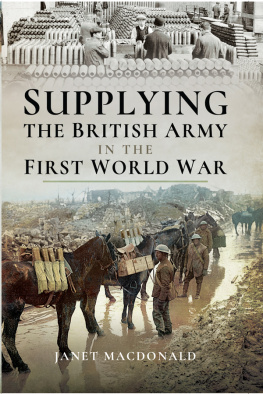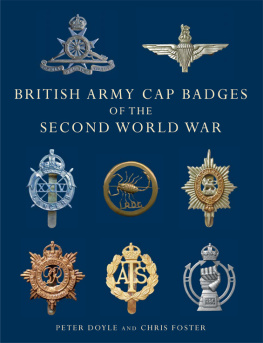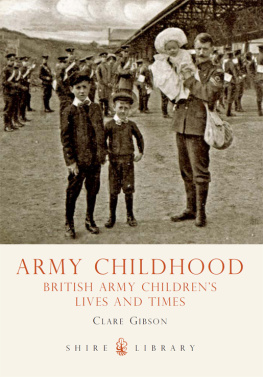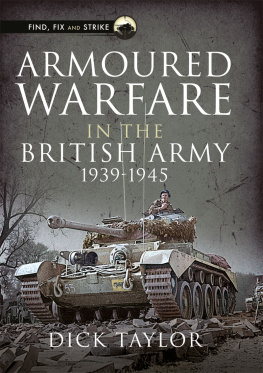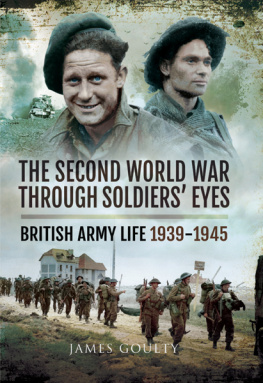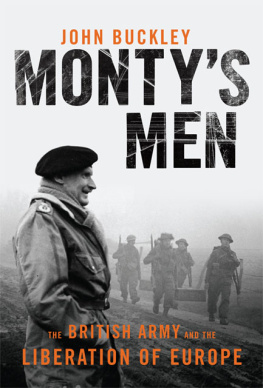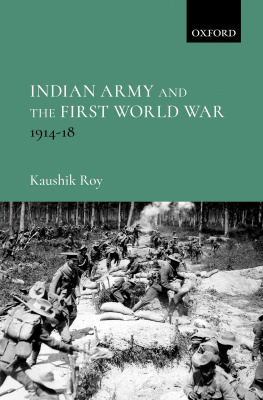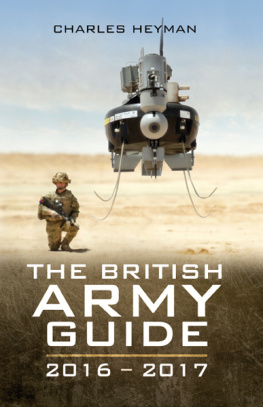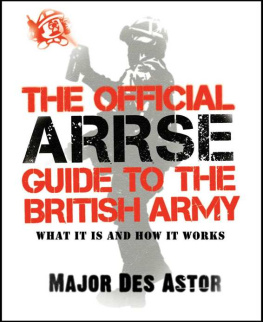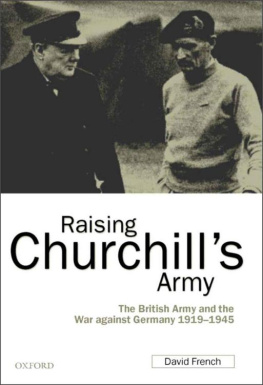AND WE SHALL SHOCK THEM
THE BRITISH ARMY IN THE SECOND WORLD WAR
DAVID FRASER

For my friends who fell
Contents
Part I
Triumph to Tragedy
Part II
Reforging the Sword
Part III
The Habit of Defeat
Part IV
The Tide Turns
Part V
Triumph at Last
This book is not an essay on grand strategy. It is a book about the British Armys character, actions, failings and achievements in the most recent of great wars in which it has taken part, but, in dealing with particular aspects or with campaigns in the circumscribed span of one volume, treatment has to be impressionistic rather than analytical. The picture has to be painted without too much detail; and only certain features can be given prominence. This book is not, therefore, a comprehensive history of all the army did. Much is omitted. I have not discussed the mighty achievements of Anti-Aircraft Command; nor the heroic defence and defiance of Malta; nor expeditions sharp and bitter at the time until the tide of war washed over them, such as those to Madagascar, into Syria, to the Dodecanese Islands, to restore the internal situation in Greece. I have, instead, painted this impression of the British Army with colours drawn from some of its major struggles.
It is impossible to write about the British Army in the Second World War and to isolate that army from the actions of its comrades from different lands. In Greece, Crete, North and East Africa, Malaya, Burma, British units or formations were a minority in what was, nominally, a British Army. The majority were Australian, New Zealand, Indian, African and South African divisions, with a gallant mixture of Greeks, Poles and French fighting for a while beside the British flag. In describing operations I have made little distinction. In discussing character, composition and tactics my observations are upon the British. Difficult though it is to write in isolation about the British Army when its troops were fighting shoulder to shoulder and intermingled with men of other nations the attempt has to be made. This book, then, is not a history of any other Commonwealth nations Army, nor of the Indian Army of the old British Empire. Still less is it aboutthe armies of Allied Powers, intimately connected though their operations later were with those of the British Army, and often under the same Supreme Command: the war was an Allied war, victory an Allied victory. But this book is about the British Army.
Marshal of the Royal Air Force Lord Tedder made one of the wisest comments on British books about war.concentrate upon their successes, and thus draw lessons too much from the later stages of conflict when there are, very often, resources in abundance. It is, Tedder wrote, the problems of the early stages which we should study. I agree. At the beginning of a war resources are in short supply. Mental and physical condition has not been hardened by battle. Illusions abound. Unless arrangements have been far-sighted and loyalty to alliance nurtured in time of peace, Allied co-operation is defective, command systems ambiguous. The psychology and condition of the nation, the army and its commanders all reflect the mood of the period of peace preceding hostilities. That mood may have engendered realism, readiness, an even determination to see that all the resources and particularly the manpower of the nation are planned to play their part if the worst occurs. The mood may, on the other hand, have been escapist, indolent, apathetic or cowardly - often seeking excuse for inaction in glib assumptions about the course of future hostilities, assumptions often brutally disproved when it is too late to react. If ever we hear echoes in contemporary events of the wasted twenty years before 1939 we should recall with melancholy what followed, and the young lives lost which realism and preparedness might have saved. Early and avoidable calamities in war are the consequence of softness, myopia and unprofessionalism in peace.
The story of the early stages of the British Army in the Second World War is not a happy one, but it is important; hence the balance of this book reflects Tedders view. I have devoted much more space to the early encounters where resources were inadequate, weapons defective, tactics and training faulty than to the glories of later years. The balance of the book does not, therefore, match the duration of particular operations, nor the comparative size of forces deployed. Indeed, in the early campaigns the scale of British operations in terms of troops employed was generally so small that the actions of single divisions, brigades or even battalions represented the military effort of the nation, and need description in order to comprehend the often disastrous outcome.
The first part of this book describes the appalling shocks suffered by the British Army in the beginning. The second and third parts tell something of the long learning period when the army was struggling towards reconstitution and competence and only the few, less than ready for their opponents and frequently mishandled, were engaged - in the Mediterranean, in Burma and in Malaya. Only in the fourth part is it possible to sense light breaking, as the British went forward from Alamein, cleared North Africa, invaded Italy, defeated the last Japanese offensive, and stood again upon the fields of France. In the last part the armys task came to culmination, the loop of its destiny completed, as the taking of Rangoon redeemed Singapore, as Dunkirk was avenged by the crossing of the Rhine, and as the army that had straggled back before Rommel at Gazala stood at last upon the Alpine passes. It is a story which moves from triumph to tragedy, and then upward again to triumph at the last.
I acknowledge with gratitude agreement of the Trustees of the Alanbrooke Settlement and Executors of the late Viscount Alanbrooke to my again using the Alanbrooke Papers in the writing of this book, and in that connection the unfailing helpfulness of the staff at the Liddell Hart Centre for Military Archives, Kings College, London.
I am especially indebted to those who have read particular chapters and given me the benefit of their knowledge and advice; and in this connection wish especially to thank Dr Brian Bond, Field Marshal Lord Carver, Major Warren Freeman-Attwood, Colonel Lord Freyberg, General Sir John Gibbon, Major-General Desmond Gordon, Major-General Patrick Hobart, Mr Ronald Lewin and Brigadier Pollock. I am most grateful, too, to those who have agreed to quotation from letters, in particular Viscount Montgomery of Alamein and Earl Alexander of Tunis.
The authorities at a number of libraries have been as helpful and patient as usual: I must especially thank the librarians and their assistants at the Royal College of Defence Studies, the Royal United Services Institute and the Ministry of Defence Library.
The typescripts, frequently repeated, have been the work of several hands, but I must particularly mention Erica Vaux. Lastly my wife, as usual, has provided throughout practical support, and patient, perceptive advice.
Part I
Triumph to Tragedy
1
The Rusting Sword
11th November 1918
Throughout the British Army in France and Flanders men rubbed their eyes and stretched their wet and weary limbs. One has been feeling ones way through the dark for four and a half years, wrote a Battalion Commander, whose time on the Western Front had been unbroken save when wounded, and now one has come out into the sunlight, but one is blind, one cannot see the sun. As companies turned out in the early morning, to march towards the enemy, to parade for training if in reserve, the message came through which had been rumoured for the previous three days. The Armistice would be signed at eleven oclock.


